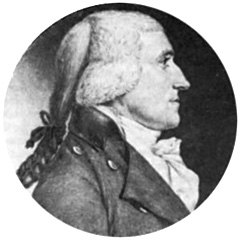
Jonathan Dayton of New Jersey was the youngest delegate to sign the Constitution. He later served in the new federal government as Speaker of the House of Representatives.
Early Life
Jonathan Dayton was born on October 16, 1760, in Elizabethtown, New Jersey. His father, Elias Dayton, was a prominent merchant and active in local politics. Dayton attended the local academy, known as the “Reeves” school after its founder Tapping Reeve. His classmates included Alexander Hamilton and Aaron Burr. After graduating, Dayton attended the the College of New Jersey (Princeton University).
When the Revolutionary War broke out, Dayton enlisted and served under his father, who commanded the 3d New Jersey Regiment. Dayton saw significant action during the war, participating in the battles of Brandywine Creek and Germantown and remaining with general George Washington at Valley Forge. In October of 1780, he was captured by the British and released several months later. After joining the 2nd New Jersey Regiment as a captain, Dayton fought in the Battle of Yorktown.
Constitutional Convention
After resigning from the Continental Army, Dayton studied law and became an attorney. His wartime reputation and political connections made public office a natural transition. He was elected to the New Jersey General Assembly in 1786.
Elias Dayton was New Jersey’s first choice to represent the state at the Constitutional Convention. However, the elder Dayton insisted that his son serve instead. At the age of 26, Dayton was the youngest delegate. Dayton did not arrive at the Convention until June 21, but was soon an active participant in the proceedings. While he participated in the debates, he largely deferred to the elder members of the New Jersey delegation.
In addition to advocating for the rights of smaller states like New Jersey, Dayton was a member of the committee that created a federal approach to national government, establishing an Electoral College to select the President and a bi-cameral legislature.
Federal Public Office
After serving again in the New Jersey Legislature, Dayton went on the play a significant role in the new federal government. In 1791, Dayton was elected to the U.S. House of Representatives. He would go on to serve four terms and become a prominent Federalist politician. He was Speaker of the House in the Fourth and Fifth Congresses. In Congress, Dayton supported the fiscal policies of Alexander Hamilton, and he helped suppress the Whiskey Rebellion. He also backed the Louisiana Purchase and opposed the repeal of the Judiciary Act of 1801.
Later Life
Livingston did not hold federal office, but rather continued to serve as Governor of New Jersey until his death. He died on July 25, 1790.







